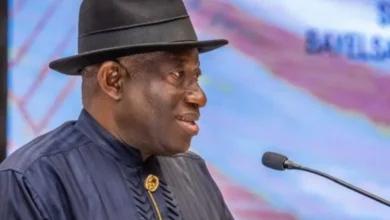‘Marked money’ with security agents’ involvement can help curb Kipnapping – Ex-DSS director


Mike Ejiofor, former State Director of Department of State services, has suggested that “marked money” for ransom in co-operation with security agencies can help stem the tide of kidnappings in the country.
Ejiofor bemoaned that ransom payments has now become a lucrative industry in Nigeria, as desperate families defy government warnings against paying money to kidnappers for the release of members.
Ejiofor spoke in an interview with ARISE NEWS on Friday, about the alarming rise of kidnapping in the country.
Over 7,000 individuals have been kidnapped and over 1 billion naira has been paid as ransom to kidnappers in Nigeria within a single year.
Ejiofor explained that the rise in ransom payments has turned kidnapping into a lucrative franchise for criminals. He noted, “Ransom payment does not help matters. It has become an industry, a franchise. It is the quickest way to make money now by criminals and the bandits.”
Despite the government’s continued efforts to discourage the movement of cash for ransom, families often find themselves in desperate situations, leading them to pay whatever is necessary to secure the release of their loved ones.
“Except you are affected or involved, you must be desperate to ensure the safe release despite government efforts,” Ejiofor said.
“First of all, the government will not encourage or pay ransom. Most of the ransoms are paid by the victims’ relations, at times without the knowledge of the security agencies. So if the security agents are not involved in the payment, they wouldn’t come out to own responsibility.”
He emphasised that the total amount paid as ransom likely exceeds 1 billion naira, a figure he described as “worrisome and very disturbing.” However, he cautioned against inciting panic by focusing too much on these figures. “We should also be careful not to create panic by these figures,” he added.
Ejiofor also spoke about the challenges security agencies face in handling the business of kidnapping. He mentioned the use of marked money as a potential tool for tracking kidnappers.
He recalled a past instance where such a tactic led to the arrest of the kidnappers of the Central Bank Governor’s wife.
“When the central bank governor, Emefele’s wife was kidnapped, marked money was used and it led to the arrest of those people. For marked money, if the security agencies get the cooperation of the victims’ relations, then we can talk of marked money, but the government is discouraging payment of ransom,” he explained.
The former DSS director also highlighted the evolving tactics of kidnappers, who have become more sophisticated in evading capture. “What the kidnappers now do is use the victims’ telephone to make calls. They have now started using diversions to mislead the security agencies, like going to a different location to make the call,” he said.
However, he was quick to dismiss the notion that kidnappers are ahead of security agencies. “They are not ahead of the security agencies; they have just been countering new measures by the security agencies. I can tell you that measures are being introduced now to ensure that these things are brought to a tolerable level,” he assured.
Ejiofor called for mass citizen participation in combating the menace of kidnapping. He stressed the importance of collective action and information sharing to support the efforts of security agencies.
“We do not have to rely on security agencies completely. Let us look at mass citizen participation. We all need to be involved and volunteer information and give necessary support because everybody is at risk,” he urged.




